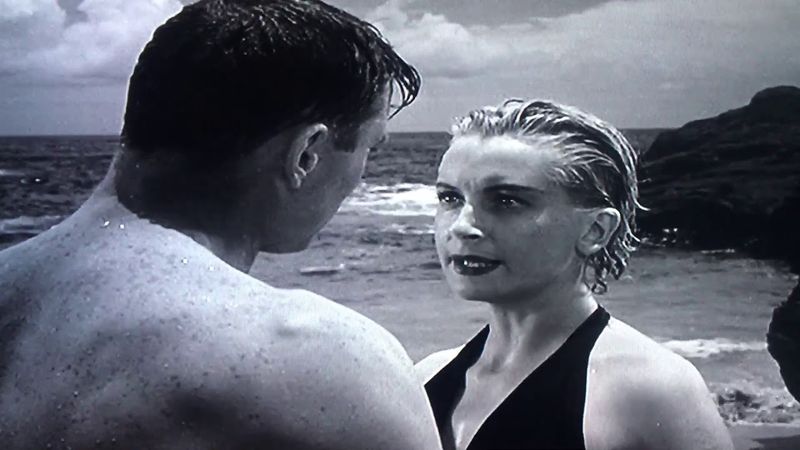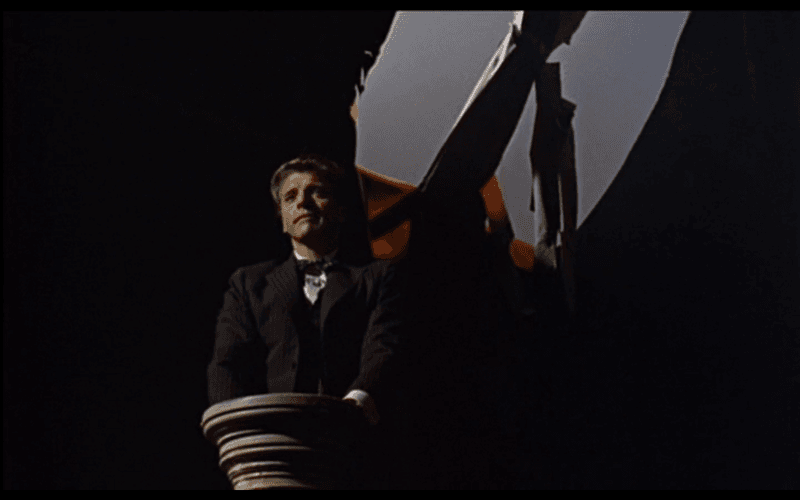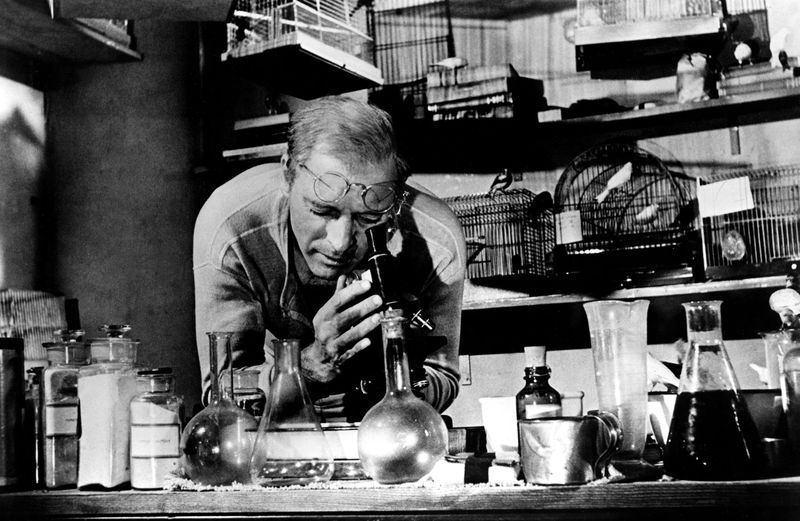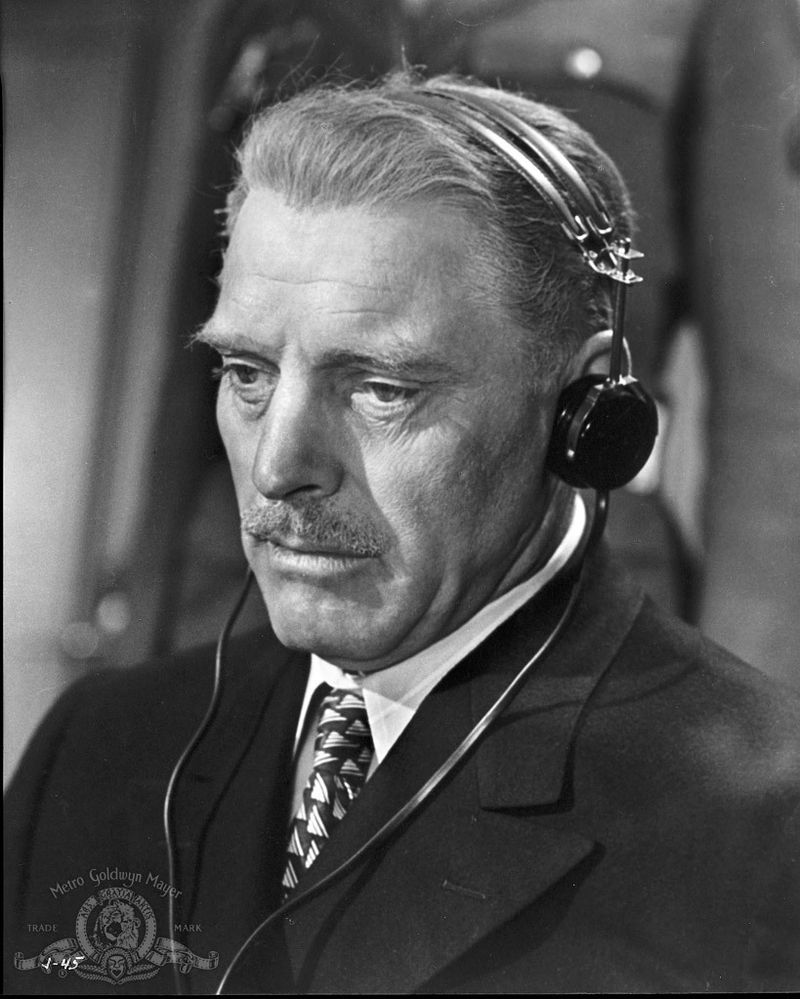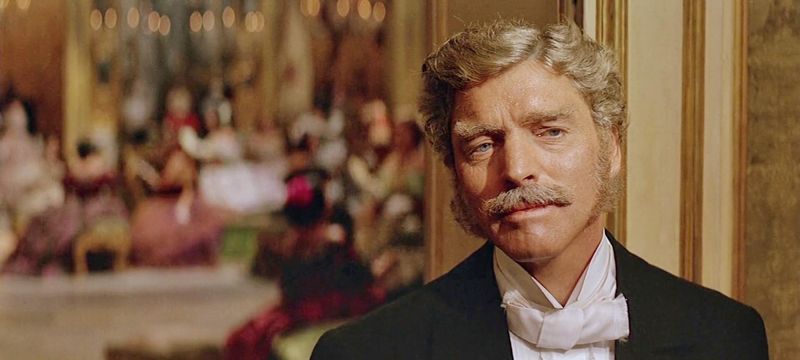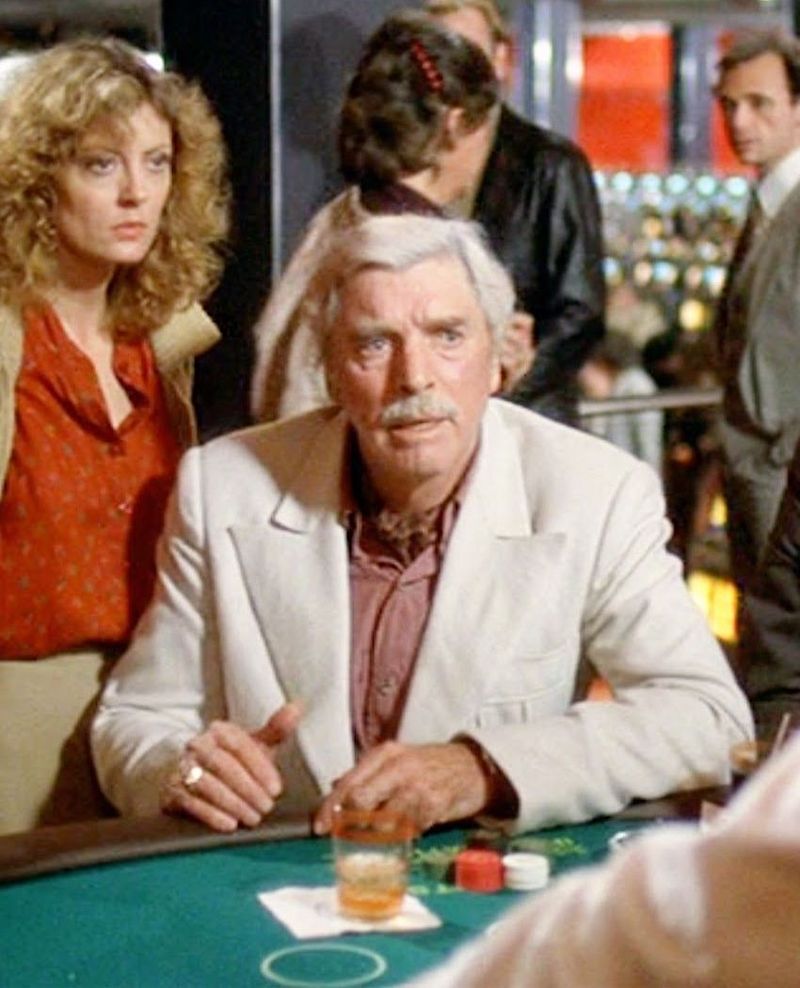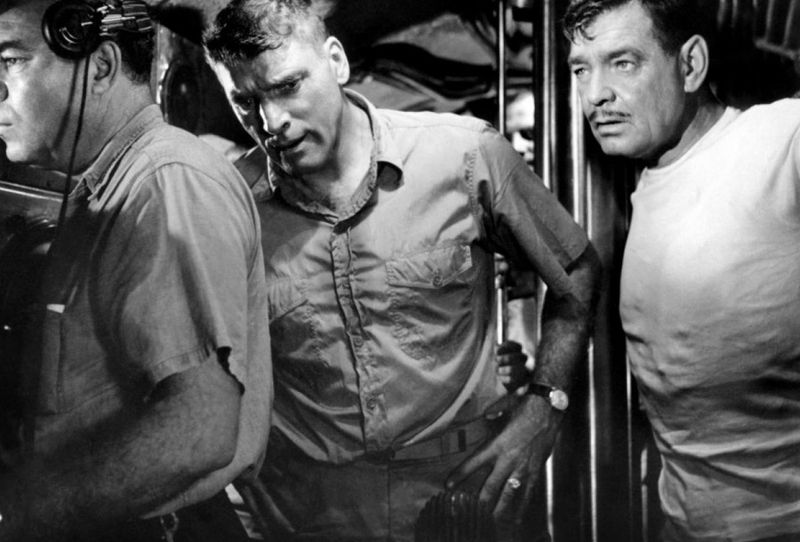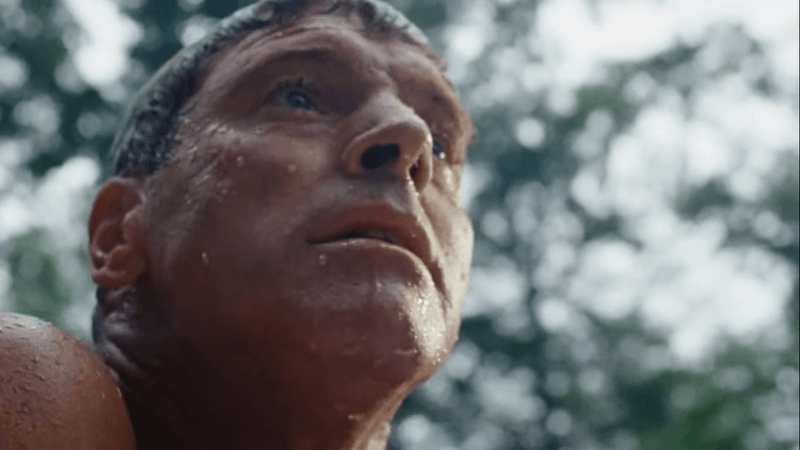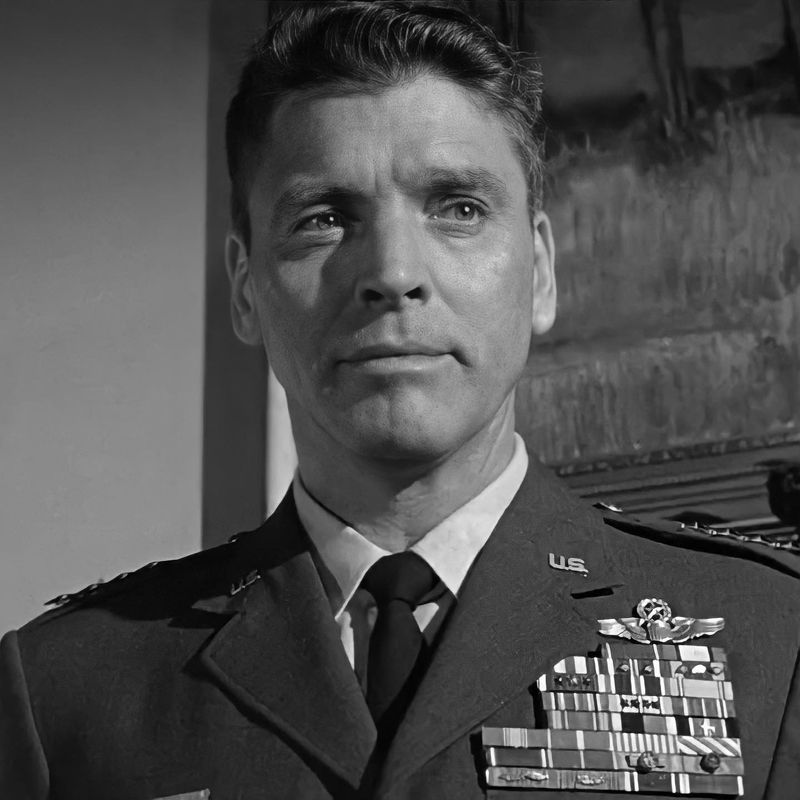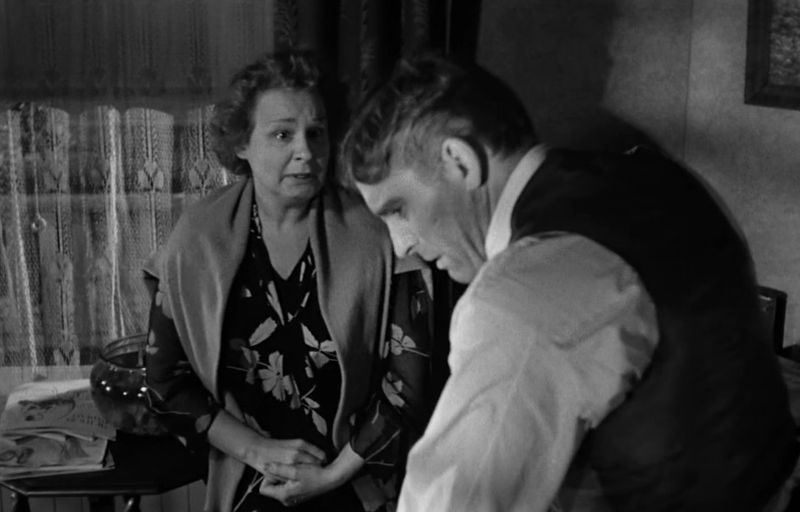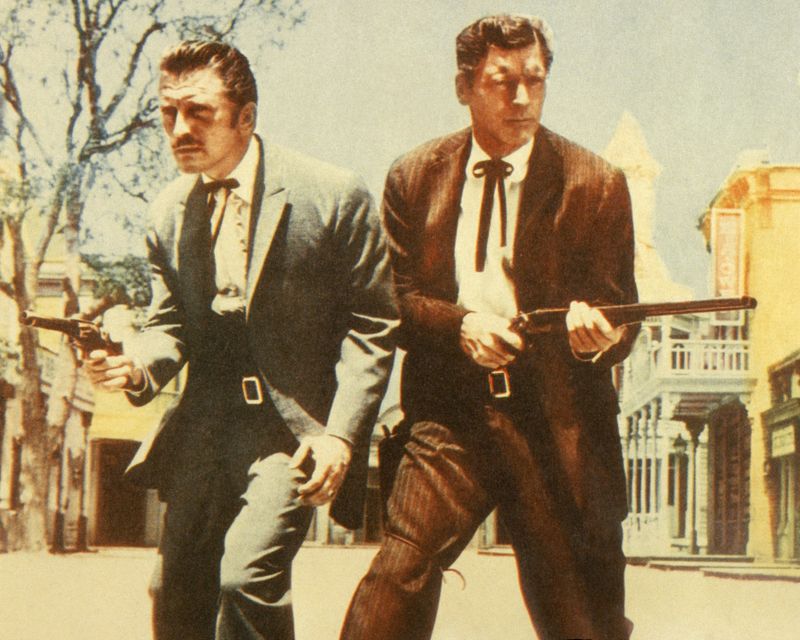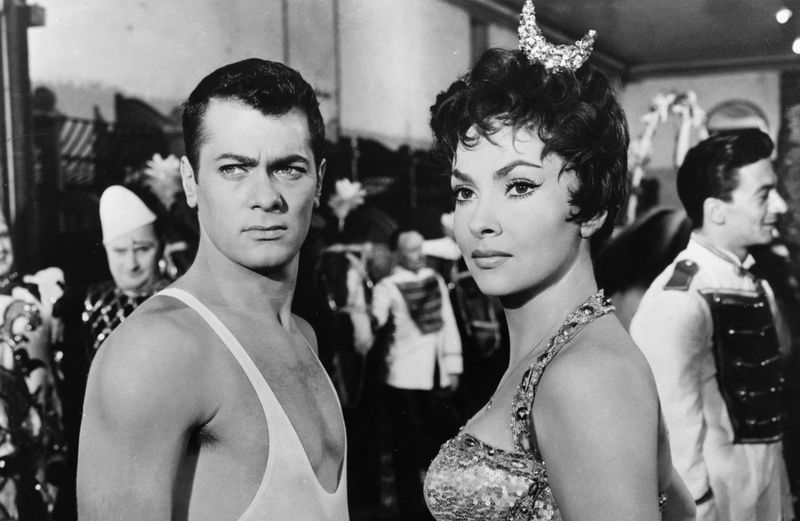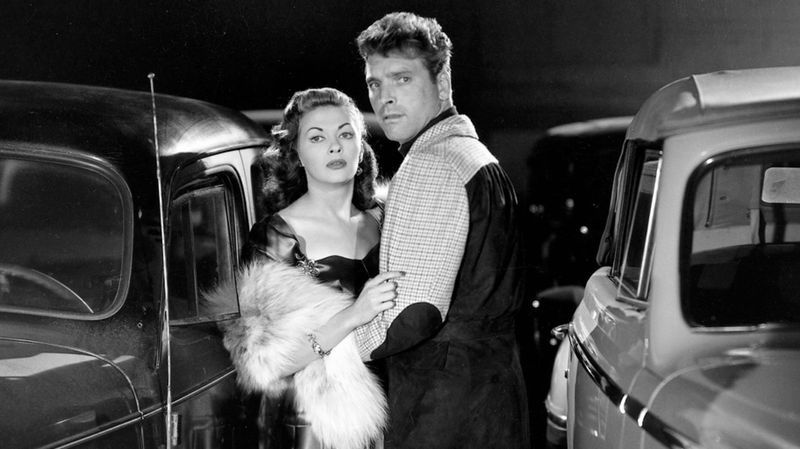Burt Lancaster stands as one of Hollywood’s most powerful actors, combining raw physicality with emotional depth throughout his 45-year career.
His piercing blue eyes and athletic physique (he began as a circus acrobat) gave him commanding screen presence, but it was his emotional range that truly set him apart.
From tough guys to vulnerable romantics, Lancaster brought unmatched intensity to every character he portrayed.
1. The Beach Scene Legend in From Here to Eternity (1953)
Lancaster’s portrayal of Sergeant Milton Warden sizzles with military discipline and forbidden passion. His famous beach scene with Deborah Kerr, with waves crashing over their embracing bodies, became one of cinema’s most iconic romantic moments.
Beyond the romance, Lancaster brings remarkable complexity to Warden – a by-the-book soldier whose principles clash with his desires. His performance earned him an Academy Award nomination.
Did you know? Lancaster performed his own stunts in the difficult beach scene, battling strong Hawaiian currents while filming those passionate kisses.
2. Fiery Evangelical Transformation in Elmer Gantry (1960)
Raw electricity pours from Lancaster’s performance as a boozing, womanizing salesman who discovers his talent for religious preaching. His charismatic sermons build from whispers to thunderous proclamations, showcasing his remarkable physical control and vocal range.
Lancaster embodies both Gantry’s manipulative charm and genuine moments of spiritual awakening. The role won him his only Academy Award for Best Actor.
Watch for the scene where Gantry delivers his first impromptu sermon – Lancaster’s eyes burn with a fervor that’s equal parts divine inspiration and calculated opportunism.
3. Caged Brilliance in The Birdman of Alcatraz (1962)
Lancaster’s portrayal of Robert Stroud requires him to convey decades of character evolution within the confines of a prison cell. His performance is a masterclass in restraint – communicating volumes through subtle facial expressions and measured movements.
The transformation from violent prisoner to gentle ornithologist unfolds with remarkable nuance. Lancaster creates a delicate balance between Stroud’s intellectual growth and underlying dangerous temperament.
The actor spent time observing prison life to prepare for this role, which earned him his third Academy Award nomination for Best Actor.
4. Venomous Power Broker in Sweet Smell of Success (1957)
Lancaster’s J.J. Hunsecker slithers through New York’s nightclub scene with reptilian menace. His gossip columnist wields words like weapons, destroying careers with calculated precision while barely raising his voice.
The actor’s imposing physical presence, typically used for heroic roles, becomes something sinister here. Behind those glasses lurks a predatory stillness that erupts in moments of controlled rage.
Lancaster and co-star Tony Curtis reportedly clashed during filming, creating real tension that translated perfectly to their adversarial on-screen relationship in this noir masterpiece.
5. Moral Reckoning in Judgment at Nuremberg (1961)
Lancaster disappears completely into the role of Dr. Ernst Janning, a once-respected German judge facing trial for Nazi war crimes. His haunted eyes reflect the weight of complicity in unspeakable atrocities.
The performance hinges on one extraordinary courtroom monologue where Lancaster transforms from proud silence to devastating confession. Without histrionics, he captures the psychological complexity of a man confronting his moral failure.
Though Spencer Tracy and Maximilian Schell received more recognition, Lancaster’s brief screen time leaves an indelible impression about how educated, principled people can become instruments of evil.
6. Aristocratic Majesty in The Leopard (1963)
Lancaster embodies fading nobility as Prince Don Fabrizio Salina in Luchino Visconti’s sweeping Italian epic. Despite being dubbed in Italian for the original release, his physical presence communicates volumes through posture alone.
The American actor holds his own alongside European cinema royalty, projecting aristocratic authority while revealing inner melancholy about changing times. His performance builds to the magnificent ballroom sequence – a 45-minute tour de force of subtle acting.
Lancaster considered this his finest performance, demonstrating his artistic ambition extended far beyond Hollywood conventions into challenging international art cinema.
7. Twilight Dignity in Atlantic City (1980)
Lancaster’s Lou Pascal represents the actor’s remarkable late-career evolution. As an aging small-time gangster clinging to faded glory, he reveals vulnerability beneath his weathered exterior.
The famous scene where he watches Susan Sarandon through a window, murmuring “you should have seen the Atlantic Ocean then,” captures decades of regret in a single moment. His 67-year-old body, still impressively fit but showing age, becomes part of the performance.
This role, which earned Lancaster his fourth and final Oscar nomination, proves his willingness to embrace characters far removed from his earlier leading-man image.
8. Underwater Power Struggle in Run Silent, Run Deep (1958)
Lancaster’s Lieutenant Jim Bledsoe simmers with controlled resentment opposite Clark Gable’s obsessive submarine commander. The confined setting magnifies every flicker of emotion across Lancaster’s face as tension builds between duty and survival.
The actor’s background as a circus performer serves him well in scenes requiring physical agility within the cramped submarine set. His commanding presence creates a worthy adversary to Gable’s legendary star power.
Lancaster performed this role shortly after forming his own production company, demonstrating his business acumen matched his artistic talents – he understood this commercial thriller would finance more ambitious projects.
9. Suburban Delusion Unraveling in The Swimmer (1968)
Lancaster’s Ned Merrill embarks on a surreal journey “swimming” home through neighbors’ pools in affluent Connecticut. Initially appearing as a confident, successful man in his prime, his facade crumbles with each new backyard encounter.
At 54, Lancaster fearlessly displays his still-impressive physique while revealing increasing psychological fragility. The performance requires him to undergo a complete emotional breakdown across a single afternoon.
The film’s troubled production stretched over two years, with Lancaster maintaining character consistency despite multiple directors and screenplay revisions – a testament to his professional discipline and artistic commitment.
10. Military Coup Mastermind in Seven Days in May (1964)
Lancaster’s General James Mattoon Scott radiates dangerous patriotism as a military leader plotting to overthrow the President. His ramrod posture and clipped speech embody military precision, while his eyes reveal zealous conviction that makes his character truly frightening.
The actor creates a villain who genuinely believes his treasonous actions serve a higher good. His confrontations with Kirk Douglas and Fredric March crackle with ideological tension.
Lancaster reportedly studied several real-life generals to create this composite character, capturing how charisma and absolute certainty can make dangerous ideas seem reasonable – a performance with uncomfortable political resonance today.
11. Devastating Alcoholic Spiral in Come Back, Little Sheba (1952)
Lancaster strips away his heroic image to play Doc Delaney, a recovering alcoholic whose fragile sobriety shatters. His performance builds from quiet disappointment to explosive rage with heartbreaking precision.
The infamous sequence where Doc falls off the wagon reveals Lancaster’s willingness to appear utterly pathetic – stumbling, slurring, and eventually threatening violence. It’s a stark contrast to the dignified characters he typically portrayed.
This early dramatic role convinced Hollywood that Lancaster was more than just an action star with a dazzling smile. His commitment to this unglamorous character established him as a serious actor willing to embrace deeply flawed characters.
12. Legendary Lawman in Gunfight at the O.K. Corral (1957)
Lancaster brings stoic intensity to Wyatt Earp, creating a lawman driven by personal code rather than emotion. His measured movements and deliberate speech contrast perfectly with Kirk Douglas’s volatile Doc Holliday.
While honoring Western conventions, Lancaster infuses Earp with psychological depth beyond the typical black-hat/white-hat morality. His unflinching gaze during the climactic shootout conveys both righteousness and the burden of violence.
The film marked the third collaboration between Lancaster and Douglas, whose contrasting acting styles created an electric screen partnership that would span seven films across their careers.
13. High-Flying Artistry in Trapeze (1956)
Lancaster returns to his circus roots as Mike Ribble, a trapeze artist who lost his nerve after an accident. His actual acrobatic background allows him to perform dangerous stunts himself, creating breathtaking authenticity rarely seen in Hollywood productions.
Beyond the physical spectacle, Lancaster conveys the psychological trauma of an athlete whose identity is shattered by injury. His performance balances bitter resignation with rekindled passion.
The film’s behind-the-scenes story enhances its legend – Lancaster trained for months to regain his acrobatic skills, insisting on performing a dangerous triple somersault himself despite being in his forties.
14. Noir Fatalism in Criss Cross (1949)
Early in his career, Lancaster established his film noir credentials as Steve Thompson, a man destroyed by obsessive love. His imposing physique makes his surrender to femme fatale Yvonne De Carlo all the more powerful – watching physical strength undermined by emotional weakness.
Director Robert Siodmak captures Lancaster’s face in shadow-drenched close-ups that emphasize his tormented expressions. The actor’s naturalistic style feels startlingly modern compared to many performances of that era.
The film’s famous final scene, with Lancaster immobilized on a stretcher awaiting execution, creates an unforgettable image of noir fatalism through his eyes alone.

